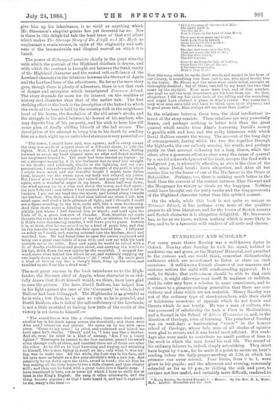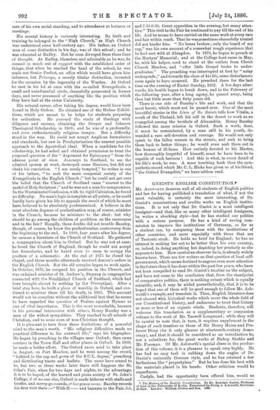EVANGELIST AND SCHOLAR.*
FOR many years Henry Bazeley was a well-known figure in Oxford. Sunday after Sunday he took his stand, habited in academic cap and gown, at the Martyrs' Memorial, and preached to the curious and, one would think, somewhat disheartening audiences which are accustomed to listen or stare on such occasions. A well-known French observer of our manners and customs notices the sight with condescending approval. It is well, he thinks, that enthusiasm should be able to find such outlets ; it might otherwise vont itself In madness or sedition. And its voice may have a mission to some consciences, and be a witness to a pleasure-seeking generation that there are con- victions and ideas which are not material. Henry Bazeley was not of the ordinary type of street-preachers, with their shrill or boisterous monotone of appeals which do not touch and threats which do not terrify. He was a man of culture, who was possessed of scholarship (he took a First in Moderations, and a Second in the School of Literce Hu»zaniores), and, in the direction of theology, even of learning. The preacher of Sunday was on week-day's a hardworking " coach " in the honour school of theology, whose help men of all shades of opinion were glad to secure, and it was found most efficient. But week- days also were made to contribute no small portion of time to the work in which the man found his real life. The record of his ordinary labours is, indeed, simply astonishing. They must have begun by 6 a.m., for he made it a point to secure an hour's reading before the daily prayer-meeting at 7.30, at which his presence was never missed. Four hours, from 9 to 1, were given to his pupils ; and the afternoon and evening, commonly extended as far as 10 p.m., to visiting the sick and poor, to services not less useful, and certainly more difficult, rendered to e Henry Beesley, the Wore Evangelist : a Memoir. By the Rey. E. L. Ricks. London: Macmillan mid Co. 1516.
men of his own social standing, and to attendance at lectures or meetings.
His mental history is curiously interesting. By birth and training he belonged to the "High Church," as High Church was understood some half-century ago. His father, an Oxford man of some distinction in his day, was of this school ; and he was educated at Radley. But he soon diverged from these lines of thought. At Radley, blameless and admirable as he was, he seemed so much out of rapport with the established order of things, that when he reached the head of the school, he was made not Senior Prefect, an office which would have given him influence, but Princeps, a merely titular distinction, invented for the occasion by the ingenuity of the Warden. At Oxford he cast in his lot at once with the so-called Evangelicals, a small and uninfluential circle, shamefully persecuted in former days, and never possessed of anything like the position which they have had at the sister University.
His natural career, after taking his degree, would have been found in Holy Orders. He obtained one of the Hulme Exhibi- tions, which are meant to be helps for students preparing for ordination. He pursued the study of theology with diligence and success, obtaining the Denyer and Johnson Theological Scholarship in 1868; and he was of a profoundly, and. even enthusiastically religious temper. But a difficulty stood in the way. He could not accept Anglican formularies and standards, but saw in Presbyterianism the nearest possible approach to the Apostolical ideal. When a candidate for the scholarship, he had asked and obtained permission to treat the proposed question of the " Argument for Episcopacy " from the adverse point of view. Journeys to Scotland, to see the admired system at work, destroyed some illusions, but did not shake his conviction. "I am sorely tempted," he writes in one of his letters, " to seek the more congenial society of the Evangelicals in the English Church ;" but he could not get over the belief that the Church of Scotland came " nearest to the model of Holy Scripture ;" and be was not a man for compromises. In the Westminster Confession, i5ith its rigid Calvinism, he found no difficulty. No man's logic is complete at all points, or he could hardly have given his life to appeals the result of which he must have believed to be absolutely predetermined. A believer in the most absolute dogmas of predestination may, of course, minister in the Church, because he ministers to the elect ; but why should he go among the children of perdition on the racecourse and in the fair ? Happily, these doubts did not trouble Bazeley, though, of course, he knew the predestinarian controversy from the beginning to the end. In 1869, four years after his degree, he oecame a licentiate of the Church of Scotland. He gathered a congregation about him in Oxford. But he was not at ease; he loved the Church of England, though he could not accept her formularies, and he hated even to seem to occupy the position of a schismatic. At the end of 1875 be closed the chapel, and three months afterwards received deacon's orders in the English Church. But the old scruples began to work again. In October, 1876, he resigned his position in the Church, and was ordained minister of St. Andrew's, Stepney (a congregation connected with the Established Church of Scotland, which had been brought almost to nothing by the Dial-ill:Ilion). After a brief stay here, he built a place of worship in Oxford, and con- tinued to minister there till his death, in 1883. This account would not be complete without the additional fact that he seems to have regarded the question of Psalms against Hymns as one of vital importance. This is the more remarkable, because in his personal intercourse with others, Henry Bazeley was a man of the widest sympathies. They reached to all schools of Christian, and to some even of non-Christian thought.
It is pleasant to tarn from these limitations of a powerful mind to the man's worth. " His religious difficulties made no practical difference to his outward life," says his biographer. He began by preaching in the villages near Oxford ; then came services in the Town Hall and other places in Oxford. In 1869, he made a bolder effort. The Oxford races used to take place is August, on Port Meadow, and he went among the crowd, " habited in the cap and gown of the B.C.L. degree," preaching and distributing tracts and leaflets. The races have ceased to be, but two or three weeks later there still happens the St. Giles's Fair, when for two days and nights, to the advantage, it is to be hoped, of the learned and pious society of St. John's College, if of no one else, Oxford is made hideous with stalls and booths, and merry-go-rounds, et hoc genus ovine. Bazeley records his first visit there:—" With H— and banners to the Fair, 3-5, and 7.30.9.30. Great opposition in the evening, but many atten- tive." This visit to the Fair he continued to pay till the end of his life. And he seems to have carried on the same work at every race and fair within reach. That he was sometimes shamefully treated did not hinder him. " No bones broken ; only the board of my cap," was his own account of a somewhat rough experience that he had met with at Abingdon. In 1870, he began to preach at the Martyrs' Memorial ; and at the College boat-races in May, he, with his helper, used to stand at the outlets from Christ Church Meadow, and " offer little Gospel books to under- graduates." The preaching was interrupted at first by "noisy undergrads ;" and towards the close of his life, some disturbances seem again to have occurred. He preached there for the last time on the evening of Easter Sunday, 1882. A few days after- wards, his health began to break down, and in the February of the following year, after a long agony, he passed away, being then but little more than forty years old.
There is one side of Bazeley's life and work, and that the most heroic, which must not be passed over. One of the most beautiful stories in the Lives of the Saints tells how Vitalis, a monk of the Thebaid, left his cell in the desert to work as an evangelist among the brothels of Alexandria. Henry Bazeley followed the same mission in Oxford. Such a work, done, it must be remembered, by a man still in his youth, de- manded a rare self-devotion and courage. He would not only speak to the fallen women in the streets, and seek to bring them back to better things ; he would even seek them out in the houses of ill-fame. How entirely devoted to his Master, how thoroughly forgetful of himself, must he have been to be capable of such heroism ! And this is what, in every detail of his life's work, he was. A more touching book than the sym- pathetic record which Mr. C. L. Hicks has given us of his friend, " the Oxford Evangelist," we have'seldom read.



































 Previous page
Previous page